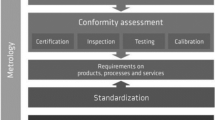Abstract
The background to the establishment of the Japan Accreditation Board for Conformity Assessment (JAB) is reviewed in relation to the latest global developments in conformity assessment activities. JAB (known as the Japan Accreditation Board for Quality System Registration at the time of its establishment) was established in 1993 as the accreditation body for quality system registration, the focal point for conformity assessment in the private sector in Japan. The extension of the area of accreditation was made in June 1996, covering all conformity assessment activities including laboratory accreditation, which resulted in the amendment of the name of the body to the current one. Various elements of the laboratory accreditation program are introduced to give the overview of this new program.
Similar content being viewed by others
Author information
Authors and Affiliations
Additional information
Received: 2 October 1996 Accepted: 5 December 1996
Rights and permissions
About this article
Cite this article
Ohtsubo, T. The Japan Accreditation Board for Conformity Assessment – Introduction to the Japanese accreditation system. Accred Qual Assur 2, 111–114 (1997). https://doi.org/10.1007/s007690050114
Issue Date:
DOI: https://doi.org/10.1007/s007690050114




